Top Rankings
Greater Commonwealth Virtual School District ranks among the top 20% of public school district in Massachusetts for:
Category
Attribute
Diversity
Most diverse schools (Top 1%)
For the 2025 school year, there is 1 public school serving 1,161 students in Greater Commonwealth Virtual School District. This district's average testing ranking is 2/10, which is in the bottom 50% of public schools in Massachusetts.
Public School in Greater Commonwealth Virtual School District have an average math proficiency score of 17% (versus the Massachusetts public school average of 42%), and reading proficiency score of 36% (versus the 45% statewide average).
Minority enrollment is 49% of the student body (majority Hispanic), which is more than the Massachusetts public school average of 47% (majority Hispanic).
Overview
This School District
This State (MA)
# Schools
1 School
1,837 Schools
# Students
1,161 Students
916,334 Students
# Teachers
76 Teachers
77,716 Teachers
Student : Teacher Ratio
15:1
15:1
District Rank
Greater Commonwealth Virtual School District, which is ranked within the bottom 50% of all 393 school districts in Massachusetts (based off of combined math and reading proficiency testing data) for the 2021-2022 school year.
The school district's graduation rate of 45-49% has increased from 30-39% over five school years.
Overall District Rank
#339 out of 397 school districts
(Bottom 50%)
(Bottom 50%)
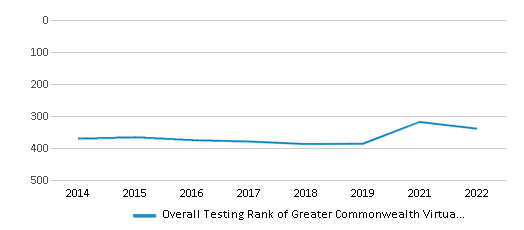
Math Test Scores (% Proficient)
17%
41%
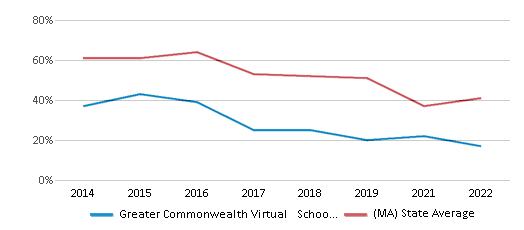
Reading/Language Arts Test Scores (% Proficient)
36%
44%
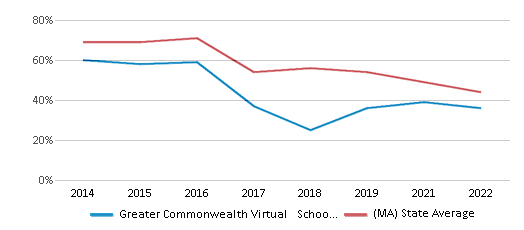
Science Test Scores (% Proficient)
25-29%
44%
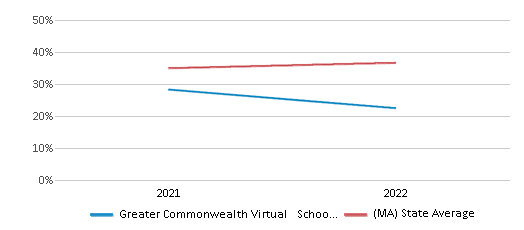
Graduation Rate
45-49%
90%
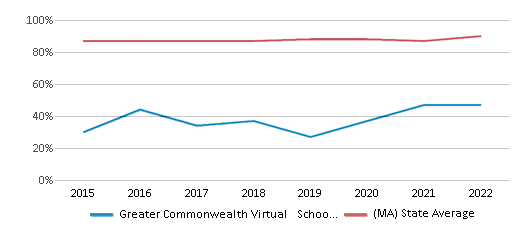
Students by Ethnicity:
Diversity Score
0.66
0.65
# American Indian Students
1 Student
2,192 Students
% American Indian Students
n/a
n/a
# Asian Students
69 Students
67,818 Students
% Asian Students
6%
7%
# Hispanic Students
302 Students
230,769 Students
% Hispanic Students
26%
25%
# Black Students
88 Students
88,074 Students
% Black Students
8%
10%
# White Students
591 Students
483,656 Students
% White Students
51%
53%
# Hawaiian Students
3 Students
785 Students
% Hawaiian Students
1%
n/a
# Two or more races Students
93 Students
41,339 Students
% of Two or more races Students
8%
5%
Students by Grade:
# Students in PK Grade:
-
32,288
# Students in K Grade:
24
62,105
# Students in 1st Grade:
33
64,458
# Students in 2nd Grade:
41
66,664
# Students in 3rd Grade:
40
64,731
# Students in 4th Grade:
55
65,978
# Students in 5th Grade:
51
67,142
# Students in 6th Grade:
74
67,086
# Students in 7th Grade:
88
68,011
# Students in 8th Grade:
116
68,221
# Students in 9th Grade:
167
73,757
# Students in 10th Grade:
139
73,439
# Students in 11th Grade:
146
71,886
# Students in 12th Grade:
185
68,770
# Ungraded Students:
2
1,798
District Revenue and Spending
The revenue/student of $10,712 in this school district is less than the state median of $23,845. The school district revenue/student has declined by 18% over four school years.
The school district's spending/student of $8,742 is less than the state median of $24,602. The school district spending/student has declined by 18% over four school years.
Total Revenue
$12 MM
$21,850 MM
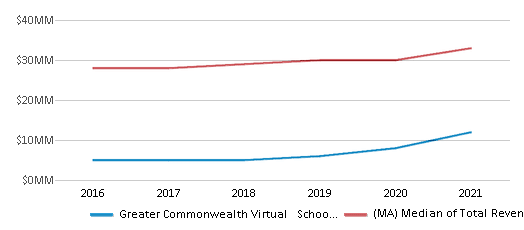
Spending
$10 MM
$22,544 MM
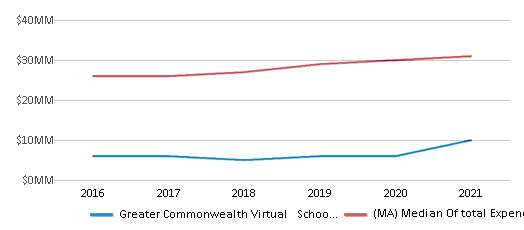
Revenue / Student
$10,712
$23,845
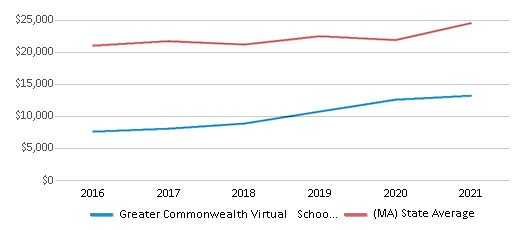
Spending / Student
$8,742
$24,602
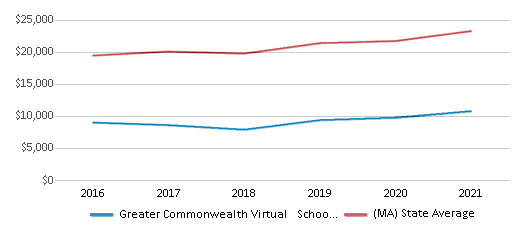
Best Greater Commonwealth Virtual School District Public Schools (2025)
School
(Math and Reading Proficiency)
(Math and Reading Proficiency)
Location
Grades
Students
Rank: #11.
Greater Commonwealth Virtual School
(Math: 17% | Reading: 36%)
Rank:
Rank:
3/
Bottom 50%10
238 Main St., 3rd Floor
Greenfield, MA 01301
(413) 475-3879
Greenfield, MA 01301
(413) 475-3879
Grades: K-12
| 1,161 students
Frequently Asked Questions
How many schools belong to Greater Commonwealth Virtual School District?
Greater Commonwealth Virtual School District manages 1 public schools serving 1,161 students.
What is the rank of Greater Commonwealth Virtual School District?
Greater Commonwealth Virtual School District is ranked #337 out of 393 school districts in Massachusetts (bottom 50%) based off of combined math and reading proficiency testing data for the 2021-2022 school year. This district ranks in the top 20% of Massachusetts school districts for: Most diverse schools (Top 1%)
What is the racial composition of students in Greater Commonwealth Virtual School District?
51% of Greater Commonwealth Virtual School District students are White, 26% of students are Hispanic, 8% of students are Black, 8% of students are Two or more races, 6% of students are Asian, and 1% of students are Hawaiian.
What is the student/teacher ratio of Greater Commonwealth Virtual School District?
Greater Commonwealth Virtual School District has a student/teacher ratio of 15:1, which is higher than the Massachusetts state average of 12:1.
What is Greater Commonwealth Virtual School District's spending/student ratio?
The school district's spending/student of $8,742 is less than the state median of $24,602. The school district spending/student has declined by 18% over four school years.
Recent Articles

What Is A Charter School?
Explore the world of charter schools in this comprehensive guide. Learn about their history, how they operate, and the pros and cons of this educational innovation. Discover key facts about charter schools, including admission policies, demographics, and funding, as well as what to look for when considering a charter school for your child.

10 Reasons Why High School Sports Benefit Students
Discover the 10 compelling reasons why high school sports are beneficial for students. This comprehensive article explores how athletics enhance academic performance, foster personal growth, and develop crucial life skills. From improved fitness and time management to leadership development and community representation, learn why participating in high school sports can be a game-changer for students' overall success and well-being.

February 05, 2025
Understanding the U.S. Department of Education: Structure, Impact, and EvolutionWe explore how the Department of Education shapes American education, from its cabinet-level leadership to its impact on millions of students, written for general audiences seeking clarity on this vital institution.





